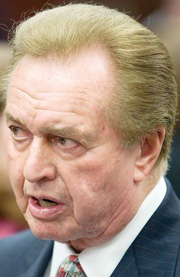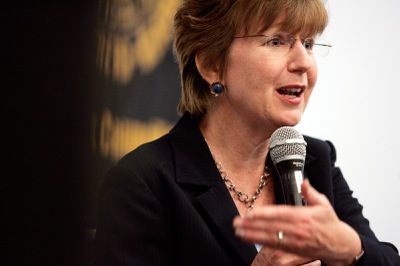Tuesday, Nov. 3, 2009 | 2 a.m.
Sun Archives
- Editorial: Penny-wise, pound foolish (11-1-2009)
- Suddenly, Gibbons meeting with lawmakers, Democrats included (9-15-2009)
- Gibbons: Jobless fund nearly broke, Legislature to blame (9-8-2009)
- Gibbons bypasses lawmakers, names stimulus director (8-18-2009)
- Gibbons not planning on special session (8-11-2009)
- Gibbons ready to tear at legislative patch (8-9-2009)
- Legislature reins in Gibbons; Democrats cite incompetence (8-5-2009)
Sun Coverage
The “no new taxes” slogan isn’t just for the governor anymore.
As tax revenue continues to plummet, a special legislative session to address a growing budget gap becomes more likely. And though there’s little agreement on how to fix the shortfall, a consensus is emerging — there’s little appetite among legislators to raise taxes.
Both Republicans and Democrats acknowledge that it will be difficult during an election year, and just five months after raising $1 billion in tax revenue, to touch the third-rail of Nevada politics — higher taxes. That means if the state’s shortfall continues to grow, more cuts to the state’s budget are likely.
“Nobody is going to want to come out and talk about raising taxes,” Senate Minority Leader Bill Raggio, R-Reno, said. “This is an election year; there’s a primary in June. From a political standpoint, it’s difficult to get anybody to support that.”
Democrats hold a two-thirds majority in the Assembly — the number needed to raise taxes — but two Republicans would be needed to reach the supermajority in the Senate. And Democrats themselves are saying tax hikes are unlikely.
“More than likely there would be additional reductions and short-term fixes,” Assemblywoman Sheila Leslie, D-Reno, said.
A Democratic lobbyist, speaking on condition of anonymity, pointed out the difficulty in passing last session’s tax increase, which followed $1 billion in cuts to spending or government growth.
Gibbons and his staff have said they want to see the tax revenue figures due this month before making a decision on a special session, which wouldn’t likely come until early December.
Some cuts could be made without full legislative approval, though some moves, such as additional furloughs or a straight reduction in employee pay, would require action by the full Legislature.
If a special session were called, it would pose another hurdle to higher taxes.
The governor calls and sets the agenda for the Legislature to consider during special sessions. Gibbons has maintained that by omitting it from the agenda he could prevent the Legislature from even considering raising taxes.
Although the legislative branch has disagreed with that reading of the state constitution, and said the Legislature can act with broad discretion on the topic at hand, the dispute has not been tested.
“Would we pass a budget with something of questionable constitutionality? The answer in the past has been no,” said Lorne Malkiewich, the Legislative Counsel Bureau director. “While we differ on our opinion of what can be done, it would come down to a legal case.”
In June 2008 Gibbons called a special session to address a budget shortfall, but in setting the agenda left the door open for legislators to raise taxes if they thought it was necessary. (They did not.)
Gibbons’ spokesman, Dan Burns, said the governor is unlikely to give the Legislature that option again.
“Gov. Gibbons has no appetite for allowing or opening the door for the Legislature to raise taxes,” Burns said, adding that in the governor’s view at least some of the 13.3 percent statewide unemployment rate is the result of higher taxes passed by the Legislature.
Legislative leaders said it’s too early to decide whether a special session will be needed.
Even if revenue continues to fall, some options remain. The state has a $160 million line of credit that it still hasn’t tapped. Additionally, some money can be moved from one fiscal year to another, which could allow the state to cover its expenses until the Legislature next meets in early 2011.
Although tax receipts have been down since the fiscal year started in July, the panel of business leaders that sets revenue projections, the Economic Forum, was already gloomy in its forecasts.
For example, Assembly Speaker Barbara Buckley said, even though the sales tax numbers were down nearly 25 percent in August compared with a year ago, the state is down only $9 million compared with what the Economic Forum projected. “It’s way too soon to be speculating on what we will do,” Buckley said.
There’s widespread fear among state workers that the governor would propose another round of furloughs, on top of the one day a month — or 4.6 percent pay reduction — the Legislature approved.
“I don’t know of anything being considered,” Burns said. “There’s no blueprint. There’s nothing like that.”
Still, Raggio said, it would be hard to make large cuts without looking at salaries, which make up the largest portion of the state’s budget.
Though he thinks the state needs a full six months of tax returns before a decision on a special session can be made, “if you had to make cuts, it would primarily be in compensation,” he said.



Join the Discussion:
Check this out for a full explanation of our conversion to the LiveFyre commenting system and instructions on how to sign up for an account.
Full comments policy